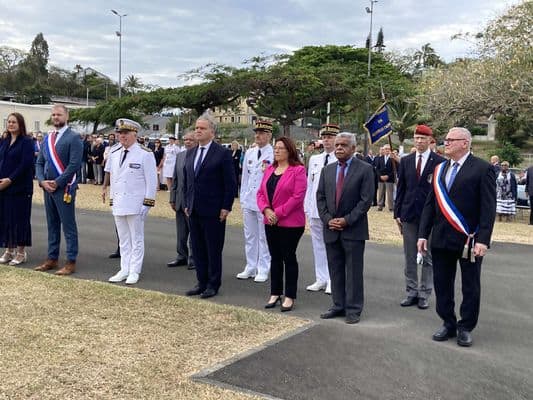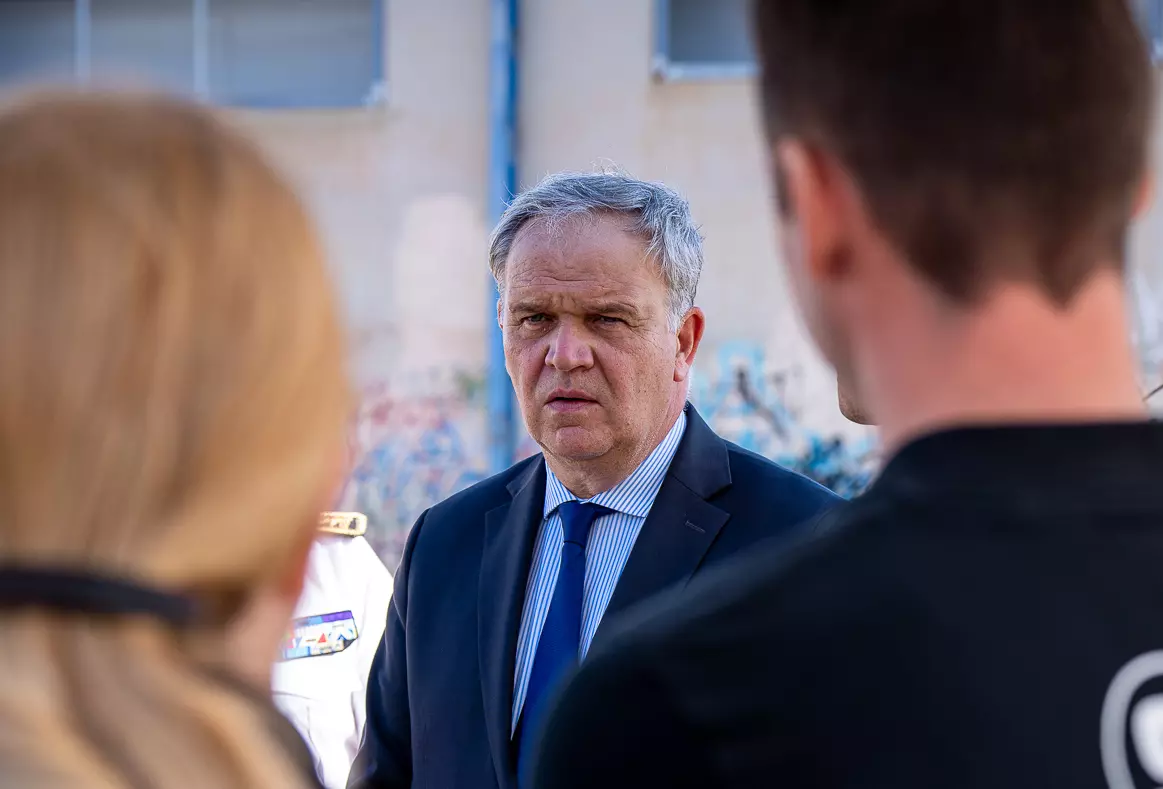By Nic Maclellan, in Noumea, New Caledonia
France’s newly appointed Overseas Minister François-Noël Buffet has travelled to New Caledonia for a four-day visit, pledging that “the time has come for the return of dialogue, of discussion, of exchange, after these terrible, even appalling, events.”
Last month, French President Emmanuel Macron appointed Buffet as Minister for Overseas Affairs. He will be responsible to new Prime Minister Michel Barnier, a fellow member of conservative political party Les Républicains.
In his first overseas visit after taking office, Buffet arrived in Noumea on 16 October to meet political, community and business leaders. After five months of conflict and clashes in the French Pacific dependency, he announced that “continuing dialogue and encouraging reconstruction are the objectives of my visit.”
The tone of his public statements was conciliatory, an implicit criticism of past efforts by President Macron and Gérald Darmanin, Buffet’s predecessor as Overseas Minister. Earlier this year, Macron and Darmanin sought to drive key independence leaders to the negotiating table, by threatening to unilaterally expand voting rights to thousands of extra French nationals resident in New Caledonia. Their proposed constitutional amendment led to months of rallies from the independence movement, who say any electoral reform must be part of a comprehensive negotiated agreement on future political status.
Ignoring months of peaceful protest, Macron forged ahead with the legislation. When it reached the French National Assembly on 13 May, the country exploded. Now, after five months of clashes between Kanak protestors and French security forces, with 13 deaths and the economy in ruins, New Caledonians are back to square one. Macron’s failed policy is now being ditched, with Paris returning to the status quo – pledging dialogue and impartiality. Many Kanak leaders remain sceptical that the French President has learned his lesson, despite stinging defeats in this year’s elections for the European Parliament and French National Assembly.
As a former member of the French Senate and head of the Senate Legal Commission since 2020, Buffet has travelled to New Caledonia and French Polynesia in recent years, contributing to Senate reports on the role of the colonies in France’s Indo-Pacific strategy.
In May 2022, Buffet led a Senate mission to Noumea, to prepare a report on “the institutional future of New Caledonia.” The report, submitted to the French Senate in July 2022, recognised that electoral reform must be part of a wider, comprehensive agreement on political status, rather than a stand-alone initiative: “It appears necessary that the new status for New Caledonia, including with regard to the organisation of the provincial elections, be developed before the next electoral deadlines.”
Last March, Buffet also travelled to Noumea as a member of another Senate delegation, to take soundings on local reactions to France’s proposed constitutional change on voting – a process which triggered the riots and clashes from mid-May. The Senate delegation warned that it was risky to push through changes to voting rights “outside of a broader political agreement on the future of the territory and within the tight timetable chosen by the government of the time”. Buffet voted in favour of the legislation when it came before the French Senate on 2 April, even though talks in Noumea had foundered.
After months of ambiguity from the French President, this package of electoral reforms has now been officially abandoned. Prime Minister Barnier has confirmed that the draft constitutional amendment on voting rights would not be submitted to the Congress of Versailles (a joint session of both houses of parliament) – a pledge reconfirmed by Buffet during last week’s visit.
As Paris changes gears on policy to New Caledonia, Buffet now must rebuild political relationships that have been badly damaged in recent months. Beyond longstanding tensions between supporters and opponents of independence, there are ongoing debates about the way forward between key members of the independence coalition Front de Libération Nationale Kanak et Socialiste (FLNKS), especially between the largest party Union Calédonienne (UC) and the Parti de libération kanak (Palika).
Meanwhile, ordinary New Caledonians are picking up the pieces.
Days of meetings
Arriving at Tontouta airport – a gateway to the islands still surrounded by razor wire – Buffet had a hectic schedule over four days. After the traditional ceremony before Noumea’s war memorial, he met with President Louis Mapou, as well as the presidents of New Caledonia’s three provincial assemblies and associations of mayors.
On Thursday, he travelled to the capital of the Northern Province to meet provincial president and Palika leader Paul Néaoutyine. The Overseas Minister also visited the industrial suburb of Ducos – an area devastated by arson attacks in recent months – and the Medipole (Noumea’s central hospital).
The following day, Buffet held a series of separate meetings with the different parliamentary groups that make up the 54-member Congress of New Caledonia: the Loyalist bloc of three parties; Rassemblement-Les Républicains; UC-FLNKS and Nationalists; UNI (Palika and UPM); Calédonie ensemble and Éveil océanien.
Despite his series of financial pledges, there were mixed reactions to Buffet’s visit. Some Loyalist politicians were concerned that the French State, distracted by its own financial and budgetary crisis, has not yet pledged sufficient resources to re-build New Caledonia’s economy.
On Friday, Calédonie ensemble leader Philippe Gomès criticised Paris for proposing to lend money to the Government of New Caledonia rather than provide grant funding for reconstruction: “The only option outlined by the minister – already announced in the draft budget tabled in parliament – is to put New Caledonia in debt to the tune of an additional 60 billion [Pacific francs] in 2025, to repay the advances made by the State last year.”
While French authorities proudly proclaim that Paris has already committed 400 million euros in reconstruction assistance, Gomès noted that “the vast majority of the 400 million aid was, in fact, paid in the form of repayable advances or loans.”
The veteran anti-independence politician, who served as President of New Caledonia in 2009-2011, warned: “If we do not fix the budget, the political dialogue that we all want will not be possible.”

Economic reconstruction
As clashes around the country since May destroyed public infrastructure and damaged private businesses, the Congress of New Caledonia passed bipartisan legislation seeking support from Paris. The proposal, calling for 4.2 billion euros investment over five years, is dubbed the Plan de Sauvegarde, de Reconstruction et de Refondation (S2R).
Last Thursday, New Caledonian President Louis Mapou opened a conference on economic reconstruction at the Jean-Marie Tjibaou Cultural Centre, calling on Buffet for commitments to stabilise the economy, invest in reconstruction and assist reform the tax base.
The same day, Buffet met with business leaders and medical staff, to understand the enormity of the economic damage from recent riots, piled on top of existing burdens – the legacy of debt from the COVID pandemic; overspending by successive conservative governments that has nearly bankrupted pension, health and housing agencies; and an ongoing crisis in the key nickel industry.
Buffet pledged that the French State would guarantee “100% of the cost required to rebuild educational institutions and 70% for reconstruction of other public buildings” that were damaged during recent riots.
Loyalist politician Nicolas Metzdorf is a member of President Macron’s parliamentary group in the French National Assembly, but he expressed his disappointment at the French government’s failure to respond to the scale of the crisis.
“Regarding the French State’s announcement of a guarantee on loans of around 500 million euros, we must in fact deduct the 440 million [euros] already paid, which only leaves 60 million euros. Basically, the State is lending us money to reimburse what we have already received.”
As businesses close their doors or battle to guarantee insurance for future operations, many people have lost their jobs or been placed on reduced hours. The French government had established a subsidy scheme for part-time employees, but these partial unemployment benefits were due to end on 31 October.
Last week, Buffet pledged to maintain the scheme until 31 December, but – given the budgetary crisis facing the French government – there are few firm commitments for next year.
This delay has compounded a trend evident over the last decade, as the population shrinks. Since May, this demographic shift has increased, as thousands of people leave New Caledonia, including business investors, Tahitians returning to Mā`ohi Nui / French Polynesia, or professionals and public servants who have abandoned their contracts.
Over the last five months, for example, an estimated 10% of all doctors have left New Caledonia, with numbers likely to increase before the end of the year. Nursing staff, pharmacists and specialists in oncology and paediatric medicine have also packed their bags. As he visited Noumea’s central hospital last week, Buffet acknowledged that “it is urgent for New Caledonia to regain serenity and calm, because this has a direct effect on the ability for doctors, nurses and healthcare workers to come and settle here.”
Even as hundreds of unionised employees lose their jobs, the economic damage is more serious for people living in squatter settlements or social housing complexes. Over the weekend, Islands Business visited a public housing estate, and residents talked of their concern over unpaid rent, electricity and water bills. “We’re worried that they will try to evict us next year”, one woman told me, “but we’ll fight to stay in our homes.”
Despite the surface calm across the islands, Buffet visited the Meunier police barracks on Thursday, to meet French police and reaffirm that nearly 6000 security force personnel will remain in New Caledonia in coming months.
After 13 deaths, hundreds of injuries and more than 2600 arrests and investigations, many indigenous Kanak are concerned about the ongoing deployment of French security forces, and the militarisation of the response to the crisis. In contrast, anti-independence politicians have welcomed the presence of 35 units of gendarmerie in New Caledonia, backed by CRS riot squads, anti-terrorist RAID officers and the GIGN (an elite paramilitary unit of the national gendarmerie).
On 12 October, French High Commissioner Louis Le Franc confirmed that deployment of police units in New Caledonia will continue despite the calming situation: “All of these forces will be maintained until the end of the year. Then, depending on the return to peace, we will re-examine a reasonable reduction in the numbers.”
During his visit, Buffet backed this extension of police deployments, stating “what I hope is that the High Commissioner retains all means of action in the territory until things return to normal.”
Sovereignty on the table
To gain time for political negotiations, the French government will delay the elections for New Caledonia’s three provincial assemblies – in the North, South and Loyalty Islands – and the national Congress. Already shifted from last May to December 2024, the elections will again be postponed until late 2025. Draft legislation to delay the polls goes to the Senate legal commission on 23 October and – if passed by the Senate – to the National Assembly on 6 November.
For the Loyalist bloc in New Caledonia’s Congress, the top priorities for France must be to guarantee stability, salvage the economy and fund the reconstruction of public infrastructure.
In contrast, key leaders of pro-independence parties want the French State to also follow through on its responsibility for decolonisation. As they discuss the prospect of renewed talks to develop a political statute to replace the 1998 Noumea Accord, independence leaders stress that any agreement must involve a pathway to sovereignty.
